|
|
|
Sort Order |
|
|
|
Items / Page
|
|
|
|
|
|
|
| Srl | Item |
| 1 |
ID:
096219
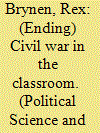

|
|
|
|
|
| Publication |
2010.
|
| Summary/Abstract |
There often exists a problematic gap between more theoretical works on war-to-peace transitions, and the practical challenges that peacebuilding operations face in the field. This article describes the use of classroom simulation to highlight the complexity of contemporary multilateral peace operations. It describes the content and mechanics of the simulation, the issues that can arise in its operation, and strategies for most effectively integrating such a simulation into overall course objectives.
|
|
|
|
|
|
|
|
|
|
|
|
|
|
|
|
| 2 |
ID:
096195
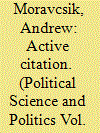

|
|
|
|
|
| Publication |
2010.
|
| Summary/Abstract |
Qualitative research dominates political science. In the field of international relations (IR), for example, about 70% of scholars primarily employ qualitative methods, compared to 21% favoring formal or quantitative analysis (Jordan et al. 2009). Since nearly all of the latter make secondary use of textual and historical methods, overall over 90% of IR scholars employ qualitative analysis, whereas 48% use any statistical and only 12% any formal methods. This understates the dominance of qualitative analysis, for many statistical data sets rest ultimately on historical work, and IR scholars, when polled, report that qualitative case studies are more relevant for policy than quantitative or formal work. Hardly any major IR debate-whether that over the end of the cold war, American unipolarity, Chinese foreign policy, the nature of European integration, compliance with international law, democratic peace, the causes of war, or the impact of human rights norms-remains untouched by important qualitative contributions.
|
|
|
|
|
|
|
|
|
|
|
|
|
|
|
|
| 3 |
ID:
096216
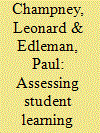

|
|
|
|
|
| Publication |
2010.
|
| Summary/Abstract |
This study employs the Solomon Four-Group Design to measure student knowledge of the United States government and student knowledge of current events at the beginning of a U.S. government course and at the end. In both areas, knowledge improves significantly. Regarding knowledge of the U.S. government, both males and females improve at similar rates, those with higher and lower GPAs improve at similar rates, and political science majors improve at similar rates to non-majors. Regarding current events, males and females improve at similar rates. However, those with higher GPAs and political science majors improve more than others.
|
|
|
|
|
|
|
|
|
|
|
|
|
|
|
|
| 4 |
ID:
096220
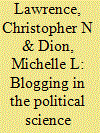

|
|
|
|
|
| Publication |
2010.
|
| Summary/Abstract |
Weblogs (or blogs), as a form of communication on the Internet, have recently risen in prominence but may be poorly understood by both faculty and students. This article explains how blogs differ from other online communication tools and how political science faculty can make use of blogs in their classes. The focus is on using blogs as part of class assignments to reinforce important skills, including critical thinking, political engagement, and essay writing. We also discuss existing academic and professional blogs that may be models for student blogging in political science.
|
|
|
|
|
|
|
|
|
|
|
|
|
|
|
|
| 5 |
ID:
096210


|
|
|
|
|
| Publication |
2010.
|
| Summary/Abstract |
Peter Bachrach had a remarkable impact on those who encountered him in person and on generations of readers. Judith Baer vividly captures, among other things, his inspiring, emboldening influence on his students and the sheer fun it was to be with him. My recollections are of exciting, forward moving, intense, and probing arguments, in private and public settings, with an infectiously warm, buoyant, generous friend.
|
|
|
|
|
|
|
|
|
|
|
|
|
|
|
|
| 6 |
ID:
096186


|
|
|
|
|
| Publication |
2010.
|
| Summary/Abstract |
During a recent meeting of the APSA Committee on Publications, headed by Lisa Martin, we discussed a proposal that had been put forward to encourage authors to deposit their data in a central repository to provide more centralized access for others seeking to replicate or extend prior work. Such a strategy should ostensibly make it easier for methodological, theoretical, and empirical work to flourish and cumulate.
|
|
|
|
|
|
|
|
|
|
|
|
|
|
|
|
| 7 |
ID:
096197
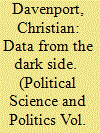

|
|
|
|
|
| Publication |
2010.
|
| Summary/Abstract |
I had interacted with professor Imari Obadele for quite some time at the National Conference of Black Political Scientists (NCOBPS). He is an elder scholar whom I knew had been politically active in the past but I was not aware of his specific affiliations or activities. At the time we first met, Obadele was only known to me as a political scientist at Prairie View. I had just begun my first job at the University of Houston a few years before. As there were not many elder black political scientists that I knew at the time, especially one interested in social movements and revolution, we immediately hit it off. It was not until a year or so after we first met and after I had published some research on the Black Panther Party (Davenport 1998a; Dahlerus and Davenport 1999; Davenport and Eads 2001), that we really started to interact.
|
|
|
|
|
|
|
|
|
|
|
|
|
|
|
|
| 8 |
ID:
096190
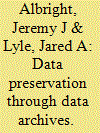

|
|
|
|
|
| Publication |
2010.
|
| Summary/Abstract |
Science functions best within a liberal democracy. Every hypothesis test is an expression of doubt, as it carries with it the implication that a particular presumption may be incorrect (Kruschke 1998), whereas authoritarianism punishes challenges to prescribed beliefs. Consequently, science can lead to true innovation and improvements in knowledge only when laws and social norms permit dissent.
|
|
|
|
|
|
|
|
|
|
|
|
|
|
|
|
| 9 |
ID:
096201
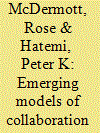

|
|
|
|
|
| Publication |
2010.
|
| Summary/Abstract |
In increasing numbers, political scientists are engaging in collaborative research. It is useful to consider the advantages of such efforts and to suggest strategies for finding optimal collaborators. In addition, there are issues and challenges that arise in the face of increased collaboration, particularly interdisciplinary collaboration across the life and social sciences. Inevitably, as the discipline has moved from a dominant solo-author model to a wider array of authorship possibilities, whether those teams encompass two-person partnerships, large research teams, or something in between, new administrative and cultural questions have already begun to surface as the discipline works to assimilate these changes. Consonant with previous efforts by the American Political Science Association (Biggs 2008; Chandra et al. 2006), we seek here to continue a broader disciplinary conversation surrounding the opportunities and challenges posed by more diverse patterns of teamwork. In so doing, we hope to help continue to encourage transparent, predictable, and openly collaborative intellectual partnerships wherein individuals receive the institutional credit and merit they deserve.
|
|
|
|
|
|
|
|
|
|
|
|
|
|
|
|
| 10 |
ID:
096204


|
|
|
|
|
| Publication |
2010.
|
| Summary/Abstract |
Multi-issue activists are sorely understudied, despite their acknowledged importance as bridges between social movements and issue domains. In this article we explore multi-issue activism, beginning with a large sample of AIDS activists and charting the degree and nature of overlapping issue involvement, the key role of "initiator" issues, and individual characteristics that promote multi-issue activism. We demonstrate that the great majority of these AIDS activists had sizable prior and ongoing participation histories in other issues, suggesting that movement across issue areas may be the norm rather than the exception. We also show that involvement in specific past issues served as gateways to later involvement in AIDS, that psychological engagement in politics prompted cross-issue activism even among these already activated individuals, and that unique personal characteristics (in this case gender and sexual orientation) led to more issue interconnectedness.
|
|
|
|
|
|
|
|
|
|
|
|
|
|
|
|
| 11 |
ID:
096217


|
|
|
|
|
| Publication |
2010.
|
| Summary/Abstract |
Teachers of political science have increasingly recognized the utility of classroom simulations to provide students with an active-learning experience to enhance learning outcomes. Our article builds on this growing trend by proposing a congressional simulation to help students understand the complexities and nuances of the lawmaking process. Specifically, the simulation aids students in identifying the deliberative aspects of congressional policymaking, appreciating the complicated process involved in a bill becoming a law, understanding the multifaceted ways in which self-interest guides the decisions of congressional actors, and challenging student cynicism about Congress as an institution.
|
|
|
|
|
|
|
|
|
|
|
|
|
|
|
|
| 12 |
ID:
096212
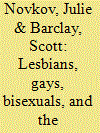

|
|
|
|
|
| Publication |
2010.
|
| Summary/Abstract |
This article reviews the results of a discipline-wide survey concerning lesbians, gays, bisexuals, and the transgendered in the discipline. We find that both research and teaching on LGBT topics have made some headway into the discipline, and that political scientists largely accept that LGBT issues can be fundamentally political and are worth studying and teaching for that reason. Nonetheless, troubling questions about discrimination both against those who conduct research concerning LBGT issues and LGBT individuals themselves remain.
|
|
|
|
|
|
|
|
|
|
|
|
|
|
|
|
| 13 |
ID:
096206


|
|
|
|
|
| Publication |
2010.
|
| Summary/Abstract |
Why are differences so political significant? Too often political science discussions of differences assume they are immutable. The attendant implication is that the political divisions attached to these variations-in religion, ethnicity, race, or any of the other dissimilarities that frequently enter political life-are considered rigid and inflexible. This commentary draws on recent work in moral and social psychology and evolutionary biology to suggest that the critical political factor surrounding differences is not their immutability but rather the moral and political salience we accord such differences. Simple experiments in social identity theory-and a conversation with an incensed 12-year old-demonstrate that the psychological process by which differences between people and groups become deemed ethically and politically relevant is totally socially constructed and hence can be restructured in a fashion that leads to more tolerant treatment of those judged different.
|
|
|
|
|
|
|
|
|
|
|
|
|
|
|
|
| 14 |
ID:
096214


|
|
|
|
|
| Publication |
2010.
|
| Summary/Abstract |
As a political scientist with expertise in human rights and the Balkans, I was invited to provide critical commentary and analysis of Kosovo's declaration of independence in February 2008 for CNN International. I offered an analysis rooted in the understanding and interpretation of international law, foreign policy, and domestic politics of Serbia and Kosovo. While I was not surprised that my analysis was not popular in Serbia-after all, I did argue that the independence of Kosovo was legitimate-I was surprised at the level of ethnic intensity and the broad-based hostile reaction to my CNN appearance in Serbia. This article first documents the harassment campaign I experienced. I then conduct textual analysis of the hate mail and online postings to offer insights about ethnicity's relation to identity, gender, and political analysis in the public sphere. I conclude by discussing how identities of researchers-as crafted by themselves and others-help define analytical tools we use in scholarly inquiry.
|
|
|
|
|
|
|
|
|
|
|
|
|
|
|
|
| 15 |
ID:
096205
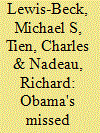

|
|
|
|
|
| Publication |
2010.
|
| Summary/Abstract |
Barack Obama was denied a landslide victory in the 2008 presidential election. In the face of economic and political woe without precedent in the post-World War II period, the expectation of an overwhelming win was not unreasonable. He did win, but with just a 52.9 percentage point share of the total popular vote. We argue a landslide was taken from Obama because of race prejudice. In our article, we first quantify the extent of the actual Obama margin. Then we make a case for why it should have been larger. After reviewing evidence of racial bias in voter attitudes and behavior, we conclude that, in a racially blind society, Obama would likely have achieved a landslide.
|
|
|
|
|
|
|
|
|
|
|
|
|
|
|
|
| 16 |
ID:
096203


|
|
|
|
|
| Publication |
2010.
|
| Summary/Abstract |
In recent years, many political science articles have changed the traditional and correct method for flagging statistically significant coefficients in tables. They now add extra asterisks at each significance level. This article describes the shift and why it should be reversed.
|
|
|
|
|
|
|
|
|
|
|
|
|
|
|
|
| 17 |
ID:
096211
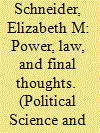

|
|
|
|
|
| Publication |
2010.
|
| Summary/Abstract |
I am pleased to be part of this symposium to celebrate the life and work of Peter Bachrach. Although my focus is the relevance of Peter's ideas of power to law, I want to begin with some personal comments as well as raise some final thoughts, drawing on others' contributions. Like so many of Peter's other students, I adored him. Peter's joy in ideas, his passion for participatory democracy, his love of teaching, and his extraordinary capacity to listen to students were infectious. As others have said, he lit up every room that he was in. He inspired me to become a civil rights lawyer and law professor and to teach, write, and advocate about issues that he cared about.
|
|
|
|
|
|
|
|
|
|
|
|
|
|
|
|
| 18 |
ID:
096192


|
|
|
|
|
| Publication |
2010.
|
| Summary/Abstract |
Political science has witnessed a renaissance in qualitative research methods (Bennett and Elman 2006). Over the last 15 years, the canon has been reworked to systematize and expand the repertoire of qualitative methods, ground them more firmly in contemporary philosophy of science, and illuminate their strengths relative to quantitative and formal methods (Bennett and Elman 2007). A rapidly expanding body of political science research now employs qualitative and multi-method analysis, and institutions dedicated to qualitative and multi-method research have flourished.
|
|
|
|
|
|
|
|
|
|
|
|
|
|
|
|
| 19 |
ID:
096207


|
|
|
|
|
| Publication |
2010.
|
| Summary/Abstract |
A while ago we lost Peter Bachrach, one of the pre-eminent academic figures of the twentieth century. After he died on December 14, 2007, a group of his former students and colleagues gathered at the APSA annual meeting in Boston to celebrate his life and career. The audience included family members, "academic grandchildren," and admirers of his work. The speakers' themes included power, poverty, activism, legal theory, and equality, and this symposium grew out of the panel. This range and variety of topics indicate the scope and depth of his impact. His 1962 APSR article, "Two Faces of Power," co-authored with Morton Baratz, is the most frequently cited article in the history of the political science profession. Although I suspect this distinction would have amused Peter, terms like faces of power, nondecision, and deciding not to decide are familiar even to those who don't know Bachrach and Baratz's work on power (Bachrach and Baratz 1962, 1963). These writings taught scholars to listen for what is not said and look for what is not shown. That was a crucial lesson for feminist legal scholars like my classmate and fellow panelist, Elizabeth Schneider, and me.
|
|
|
|
|
|
|
|
|
|
|
|
|
|
|
|
| 20 |
ID:
096208


|
|
|
|
|
| Publication |
2010.
|
| Summary/Abstract |
When I reflect upon Peter Bachrach's political theorizing from the perspective of the heated primary battles of 2008, I am struck by the unusual character of his political insights and commitments-and of how relevant and compelling they are in the current political climate. Peter might be appropriately considered a radical liberal democrat-who focused very sharply on the tensions between radicalism and liberalism as political ideologies, but sought to maintain a close and continually flowing circuit between radicalism and liberalism as bodies of philosophical understanding that could mutually nurture and sustain each other. Under his hermeneutical gaze, Hobbes was not only the father of modern philosophical liberalism but the theorist who instigated the formation of participatory democracy. By clarifying for us the extent to which we lacked foursquare rational props to support our judgments across a whole spectrum of human experience from everyday practical affairs to science, religion, and metaphysics, he cleared a tremendous space for human beings to actively participate in structuring their own lives and shaping their own destinies. In addition to his explicit statements concerning human equality (whose political payoffs would be mostly unusable by a contemporary democrat), there was implicit in Hobbesian theorizing a massive re-inflection of human limitation and possibility that could make participation seem like a plausible complement to his theorizing.
|
|
|
|
|
|
|
|
|
|
|
|
|
|
|
|
|
|
|
|
|